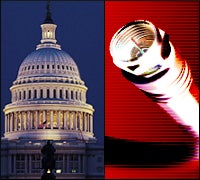 |
Rep. Eric Massa, a freshman Democrat from New York, today announced plans to introduce a bill that would require ISPs to secure regulatory approval before rolling out a pricing model that would charge consumers based on how much they use their Internet connection.
Massa’s bill stems from a dispute earlier this year over
The consumer backlash was swift and vocal, and though Time Warner Cable put the plan on hold, Massa said at the time that he would pursue legislation to curb the practice.
“This bill frankly is a result of a very, very strong grassroots movement that demanded a fair billing practice,” Massa said this morning on a conference call with reporters. “Our goal is that volume-based pricing, frankly, is detrimental to our economy and our Internet future.”
In a broad sense, the bill reflects the belief that as more and more content, services and information move online, Internet access has become a basic right and critical infrastructure like electricity and roads, a view that is shared by many in the new administration. Framing the issue in that context clears the way for a utility-style regulatory framework.
The Broadband Internet Fairness Act would extend regulatory authority over ISPs’ pricing plans to the Federal Trade Commission.
ISPs looking to implement a usage-based pricing model of the sort Time Warner Cable has been tinkering with since last January would have to secure regulatory approval from the FTC, in consultation with the Federal Communications Commission.
The FTC would have the authority to block a pricing plan it determined to be unreasonable or discriminatory, and impose penalties to any ISP that broke the rules.
The bill would only apply to ISPs with more than 2 million customers.
It would also call for public hearings to discuss any pricing plans under review at the FTC.
A spokesman for Time Warner Cable declined to comment on the bill, telling InternetNews.com, “As previously announced, Time Warner Cable has placed all of its plans to test consumption-based billing ‘on the shelf,’ including the trial in Beaumont, Texas,” the market where it began the trial last January.
Time Warner Cable has said that usage-based pricing models are necessary to help it recoup the costs of soaring data demands on its network. The company has said it continues to believe that the model is the best plan for consumers, but that it needs more time to educate them about the practice.
It also notes that usage-based billing is a common practice in Canada, the United Kingdom and other markets, and that other ISPs, including AT&T and Comcast, have been experimenting with alternate pricing structures in the United States.
[cob:Special_Report]Time Warner Cable’s plan, at its most extreme, would have roughly tripled the cost for an unlimited data plan, a rate hike Massa said threatened to drive businesses out of his district.
Massa, who consulted with allies in the tech sector like Google (NASDAQ: GOOG) and Microsoft (NASDAQ: MSFT) in drafting his bill, said he is not necessarily opposed to a tiered pricing structure that would charge higher rates for faster connection speeds. His gripe is when ISPs set caps on how much data subscribers can transmit, and then charge overage fees when they exceed their limit.
Massa has also been working with Free Press, the media-reform group that organized a petition drive to protest Time Warner Cable’s pricing plans in April, and Phillip Dampier, a Rochester resident who set up the Web site StoptheCap.com to protest usage-based pricing plans.
Massa admits that he faces long odds in passing legislation that would impose a utility-style degree of regulation on ISPs, which are backed by the powerful cable and telecom lobbies.
“The forces that oppose this bill have already hired lobbyists,” he said. “I fully expect to be burned in Internet effigy by special interests.”
He said that about a dozen representatives had already warned him that with his new bill, he was “attacking a goliath.” He is planning to introducing the bill with no co-sponsors, and hopes that a grassroots campaign like the one that took off in April will build momentum and sway his colleagues.
“The reality is, I think this is a battle that needs to be fought,” he said.


